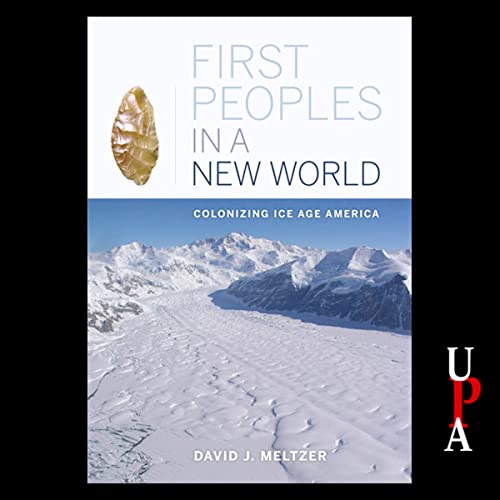
First Peoples in a New World
Colonizing Ice Age America
Failed to add items
Add to Cart failed.
Add to Wish List failed.
Remove from wishlist failed.
Adding to library failed
Follow podcast failed
Unfollow podcast failed
3 months free
Buy for $24.95
No default payment method selected.
We are sorry. We are not allowed to sell this product with the selected payment method
-
Narrated by:
-
Christopher Prince
-
By:
-
David J. Meltzer
More than 12,000 years ago, in one of the greatest triumphs of prehistory, humans colonized North America, a continent that was then truly a new world. Just when and how they did so has been one of the most perplexing and controversial questions in archaeology. This dazzling, cutting-edge synthesis, written for a wide audience by an archaeologist who has long been at the center of these debates, tells the scientific story of the first Americans: where they came from, when they arrived, and how they met the challenges of moving across the vast, unknown landscapes of Ice Age North America. David J. Meltzer pulls together the latest ideas from archaeology, geology, linguistics, skeletal biology, genetics, and other fields to trace the breakthroughs that have revolutionized our understanding in recent years. Among many other topics, he explores disputes over the hemisphere's oldest and most controversial sites and considers how the first Americans coped with changing global climates. He also confronts some radical claims: that the Americas were colonized from Europe or that a crashing comet obliterated the Pleistocene megafauna. Full of entertaining discriptions of on-site encounters, personalities, and controversies, this is a compelling behind-the-scenes account of how science is illuminating our past. The book is published by University of California Press.
©2009 The Regents of the University of California (P)2011 Redwood AudiobooksListeners also enjoyed...




















Critic reviews
People who viewed this also viewed...
















great read, learned alot
Something went wrong. Please try again in a few minutes.
Can also search the author on any podcast app. Has done several interviews, A Life In Ruins podcast had one that is worth hunting down, among others.
A Fantastic Dive
Something went wrong. Please try again in a few minutes.
Very informatine
Something went wrong. Please try again in a few minutes.
First Peoples - Fantastic
Something went wrong. Please try again in a few minutes.
leaves room for imagination.
Something went wrong. Please try again in a few minutes.
so informative
Something went wrong. Please try again in a few minutes.
As far as the book itself, I really enjoyed it. It gets quite technical for a couple of chapters in the middle, but the info is useful for understanding the rest of it. Would definitely recommend.
No Issues with the Narrator
Something went wrong. Please try again in a few minutes.
If you could sum up First Peoples in a New World in three words, what would they be?
Interesting information and its not completeWhat was one of the most memorable moments of First Peoples in a New World?
This book was very interesting but the part about grasses changing and that being toxic to the mega fauna as apposed to human incursion was particularly so since most of what I have read to date points to human hunting pressure as the culprit.What three words best describe Christopher Prince’s performance?
Mr. Prince reads too fast to get the full picture. This is intricate and complex. The geography alone encompasses half the world. He leaves no space between sentences to absorb information.If you were to make a film of this book, what would the tag line be?
epic adventureAny additional comments?
Re-record and have the reader add better inflection, better timing and pacing.Riveting story!
Something went wrong. Please try again in a few minutes.
The audible version of this book is almost unbearable. The reader is monotonous using no inflection or emotion. It is almost robotic.
Great book, horrible audio
Something went wrong. Please try again in a few minutes.
SOME DAY - if we're all fortunate - archeologists will come to realize that second only to WATER, FOOD and SEX (and maybe not even those!) mankind possesses an innate, powerful need for PRESTIGE...
And this need is fed by TRADING of prestigious, difficult-to-obtain ITEMS.
And it is via TRADING that these flint points moved SO VERY FAST across all of the Americas...
So we'll finally understand that the PEOPLE in fact BARELY MOVED, each only within their own regions-of-familiarity (and comfort) but their ITEMS traveled over vast vast distances. And FAST.
And if PEOPLE actually traveled all this way, it was MORE likely the BRIDES and HUSBANDS who moved, NOT the MAKERS (of items) or the TRADERS of items....
INITIALLY APPEARS TO REGURITATE DOGMA, THEN RESISTS TO GIVE ENJOYABLE READ...
Something went wrong. Please try again in a few minutes.



